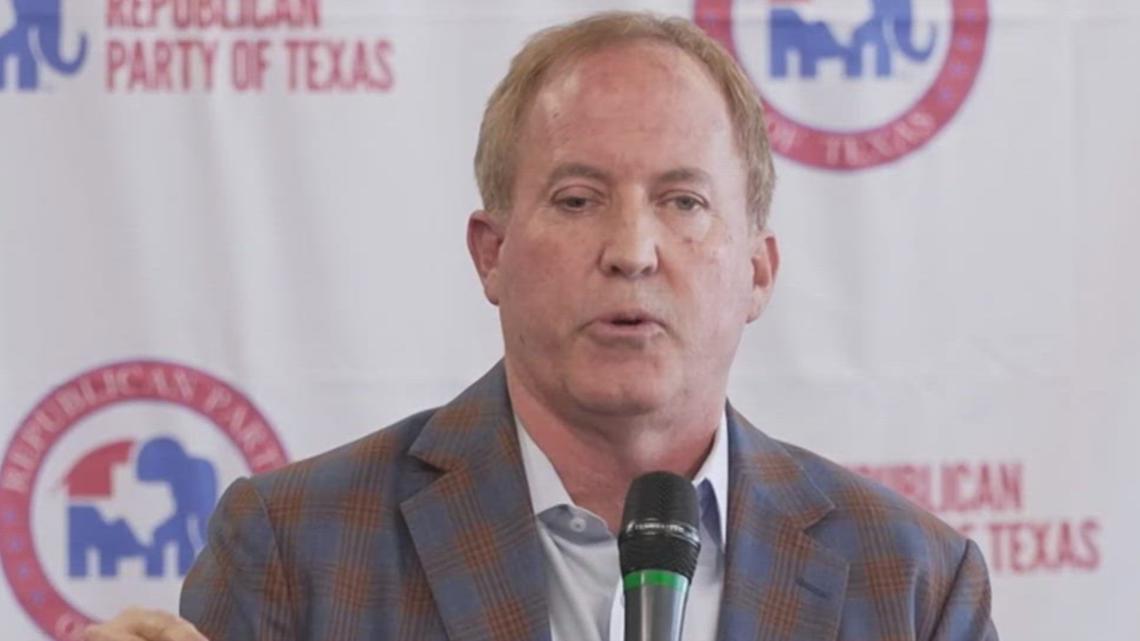
Texas Attorney General Ken Paxton’s request sought to “upend” the Women’s March Madness tournament, attorneys for the NCAA wrote.
LUBBOCK, Texas — By denying a request from Texas Attorney General Ken Paxton Tuesday, a Lubbock-area judge spared the NCAA Women’s Basketball Tournament from last-minute chaos.
Paxton is suing the NCAA over its transgender participation policies. He contends the association is misleading consumers by labeling certain competitions as “women’s sports,” while allowing transgender athletes to participate.
In February, the NCAA tightened its policies to comply with President Donald Trump’s executive order, which threatened federal funding for institutions allowing transgender athletes to compete against women. Paxton’s suit contends the new policy does not actually prevent such participation.
“It is an illusion of change designed to trick consumers into re-engaging with the NCAA,” Paxton argued in a filing.
In February, Paxton asked Judge Les Hatch for an injunction that would’ve forced the NCAA to “immediately begin screening the sex of student athletes” or drop terms like “women’s” or “female” from the association’s branding.
The lawsuit argues the NCAA’s policy violates Trump’s executive order because it acknowledges a transgender identity.
Paxton also contends the NCAA’s policy contains loopholes. He points to language within the guidelines that he says could allow a transgender athlete to change their birth records and become eligible to compete against women.
“The policy allows, still, some wiggle room,” Jonathan Saenz, an attorney for Texas Values, said. “We know, in many states, that you can change a birth certificate. Texas is not one of them, but what about athletes that come from other states to compete in Texas?”
The NCAA has refuted the claim, saying it will not allow people with altered birth records to compete against women. Texas’s own law banning transgender athletes from competing in women’s sports relies on birth records, not sex screening, to determine eligibility.
In a legal retort, Haynes and Boone attorneys representing the NCAA noted that Trump has praised the association’s compliance with his executive order. A March 6 White House memo listed the NCAA’s participation as one of its chief accomplishments.
“It may seem like it’s just about sports, but it’s not just about sports,” Equality Texas interim CEO Brad Pritchett told WFAA. “This is not about protecting anybody. Ken Paxton’s political agenda is and has always been to try and erase trans people from public life in the state of Texas.”
The attorney general’s office did not respond to WFAA’s request for comment Wednesday.
In his filing, Paxton suggested the NCAA employ a kind of genetic test, often performed with a blood sample, to identify the presence of the SRY gene located on the Y chromosome.
The International Olympic Committee ceased SRY testing after the 1996 games when eight female athletes failed the test. Each had androgen insensitivity syndrome or 5-alpha-reductase deficiency that affected the test results. The eight women were all eventually cleared to compete.
“Biology is an interesting thing,” Pritchett said. “It doesn’t do everything the same all the time. This is not a black or white situation.”
Pritchett and others contend any form of sex screening is invasive. The practice has a long history of exploitation, according to a Human Rights Watch report.
Hatch, a Republican, questioned whether any test could provide accurate results, according to a Lubbock Avalanche-Journal courtroom report.
“Before I started delving into this lawsuit, I figured there was a test out there that was black and white, that was 100%, but I think if that were the case, that would have been included in the executive order,” he said. “It’s just not there.”
Several female athletes testified during the lengthy hearing on the injunction Tuesday, including former Kentucky swimmer Riley Gaines and former San Jose State volleyball player Brooke Slusser.
Slusser, who joined a separate lawsuit against the NCAA, graduated from Denton Guyer.
Saenz told WFAA the state’s lawsuit would “hold the NCAA accountable” for previous policies that may have allowed transgender athletes to compete against women.
“They don’t want to be honest with the public,” Saenz said.
In December, NCAA president Charlie Baker told lawmakers there are less than ten college athletes who publicly identify as transgender. More than 500,000 student-athletes compete in NCAA-sanctioned events.
Attorneys for the NCAA accused Paxton of trying to “hold the NCAA Women’s Basketball Tournament hostage” to advance a political agenda.
Games began Wednesday. The injunction would almost certainly have delayed the tournament’s tipoff by forcing a last-minute rebrand or genetic testing for hundreds of athletes.
In its filing, the NCAA’s attorneys said there is no evidence a transgender female will participate in the tournament and that the NCAA is not aware of any transgender athletes competing in any division of women’s college basketball.
“The Trump administration has made clear that the new NCAA policy is consistent with the Keeping Men Out of Women’s Sports Executive Order,” the association said in a statement Wednesday. “The NCAA is looking forward to another championship season getting underway for thousands of women student-athletes competing for national titles.”
Hatch has not yet ruled on the case’s merits, only denying Paxton’s request for an immediate injunction.
“This case is far from over,” Saenz said. “It’s in no way a signal of how things are going to go in the future.”
